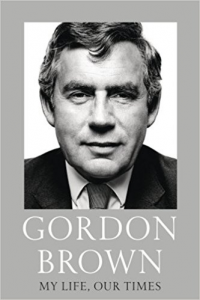Having successfully downsized my living and therefore ‘storage’ arrangements I think twice about buying a book! I was, however, immediately drawn to this political autobiography, not least because on the two occasions I met Gordon Brown I found him humane, reflective and generous. Retired politicians, we are told, are generally more attractive than practising ones because possibly they can no longer do any harm.
This is a life meticulously well written with a careful attention to detail. There is an openness and self-awareness to his narrative alongside some inspiringly articulated set of convictions about wanting to create a better and more equal world,
‘Politics was more than the art of the possible; it was about making the desirable possible’.
Interesting to ask how any of us maintain a balance between the pragmatic and the ideal. In this at the beginning of the first chapter Brown describes the leadership in this way:
‘leaders need a command of substance, mastery of detail, problem-solving skills and an ability to see the big picture… Leaders need to communicate a positive vision of the future that can inspire and motivate people and mobilise enthusiasm for progress and change’.
I share some sympathy with Brown as is honest about the relationship between the public and the private in his life and character. Over and again he stresses how private he is, how out of sympathy with what he calls “public displays of emotion” in a “touchy-feely era”.
And lest we moved too quickly into judgement or condemnation we all want to feel that ours is a life well lived and even perhaps that we have left the world a better place as a result of our energy and passion? It is understandable therefore that Brown wants to put the record straight and indeed go further in articulating what he felt he achieved in high public office.
Brown tells us very clearly that Blair did break a promise that he would step down as prime minister in favour of Brown during the second term. We also learn, despite a wide variety of accounts to the contrary that she and Blair were not permanently at loggerheads. Brown put some distance between his role in the Iraqi war and informs his reader that it was he that saved Britain from membership of the euro. It is, perhaps, impossible for any reader to evaluate some of these judgements except to say for this one there is a quality of reflectiveness in this text that was encouraging, illuminating and convincing. We glimpse a picture of the almost impossibility of survival in 10 Downing Street given the sheer pace of change and movement in communication. The relentlessness of it all is tiring even in the reading of events, challenges and difficulties.
Brown is most disarming when he describes his upbringing. The security and influence of being born a minister’s son clearly shaped his values and worldview. His passion for Scotland and especially Fife where he now lives. His fortitude and driven us at Edinburgh University. His love for John Smith and a reminder of the sheer unpredictability of politics. His heart-breaking loss of the death of his baby daughter Jennifer and his own, quite literal, blindness in one of his eyes. Brown’s honesty and vulnerability are disarming and attractive in equal measure.
Brown reveals himself as a profound intellect and thinker. He knows about the depth and seriousness of our alienation from politics. He describes accurately the fraudulent Tory rhetoric misrepresenting a global banking collapse as a failure of Labour politics. He connects this decade’s two referendums (Scotland and Brexit) on the consequence of previous political dishonesty. His anger, his greatest anger is kept for what he describes as a callous enforcement of austerity that has generated inequality and inflicted needless suffering on the poor and unprotected. We would all do well to consider, whatever our political allegiances, the fact that the financial sector has paid out a total of £128 billion in bonuses since 2008.
Such a life narrated will have its limitations, its shortcomings and even flaws. The reader will take a variety of judgements on those. We need more stories that can help us understand the world we are living in. We need more people to empower individuals and communities to work together for sustainable inclusion and change. Politics is part of the picture not the whole canvas and we would be right to be cautious in so assigning responsibility for failure in the direction of politicians that we absolve ourselves of any part in working for solutions to some of the serious challenges that face us.
We all have partial sight and live with significant dollops of ignorance which constrain and limit us. Self-knowledge is a long, a lifelong journey. Honesty is painful. With this in mind we might forgive Gordon some of his own limitations but also be prepared to honour and respect his contribution, his struggle, his challenge to us all to play our part in delivering a bigger, fairer and more equal society.


